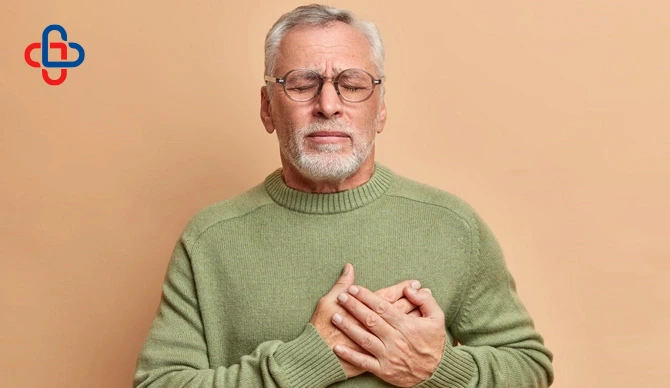Experiencing chest pain can be painful and alarming, as it might be challenging to distinguish between gas pain and heart attack. While both conditions can cause discomfort and share some common symptoms, their origins and implications are significantly different. Therefore, differentiating between gas pain and heart attack signs is essential for timely medical intervention.
In today’s blog, we will explore the characteristics of gas chest pain and heart pain, explore the common symptoms they manifest, and provide guidance on when to seek medical attention.
Table of contents
Understanding the Symptoms of Gas Pain
Gas pain is usually caused by eating gas-produced foods, indigestion, acid reflux, or gastrointestinal disorders. Gas pain is a common and often benign condition resulting from the accumulation of gas in the digestive tract. This can cause discomfort and pain, typically in the abdomen but sometimes radiating to the chest.
Common Symptoms of Gas Pain
- Abdominal Bloating
- Sharp, Jabbing Pains
- Belching and Flatulence
- Cramping
- Discomfort Relieved by Passing Gas
These symptoms are usually related to diet, swallowing air, or digestive disorders like irritable bowel syndrome (IBS).
Identifying the Symptoms of a Heart Attack
You might have a question what is a heart attack? A heart attack, or myocardial infarction, occurs when blood flow to a part of the heart is blocked, causing damage to the heart muscle. Recognizing the symptoms of a heart attack is vital for prompt medical treatment and can be life-saving.
Common Symptoms of a Heart Attack
- Chest Pain or Discomfort
- Upper Body Pain
- Shortness of Breath
- Cold Sweat
- Nausea or Lightheadedness
- Fatigue
Heart attack symptoms can vary between individuals and can be more subtle in women, the elderly, and people with diabetes.
Gas Pain vs Heart Attack
While gas pain and heart attack symptoms can overlap, key differences can help distinguish between the two.
Location and Nature of Pain
Gas Pain: Typically causes sharp, jabbing pain that can shift location and is often relieved by passing gas.
Heart Attack: Usually involves a persistent, crushing pain in the center of the chest that can radiate to other parts of the upper body.
Associated Symptoms
Gas Pain: Often accompanied by bloating, belching, and flatulence.
Heart Attack: Frequently associated with shortness of breath, cold sweats, and nausea.
Duration and Relief
Gas Pain: Pain can fluctuate and is often relieved by changes in position or by passing gas.
Heart Attack: Pain is more continuous and doesn’t improve with changes in position or passing gas.
Trigger Factors
Gas Pain: Often triggered by diet, digestive issues, or swallowing air.
Heart Attack: This can be triggered by physical exertion, high blood pressure, stress, or a blockage in the coronary arteries.
When to Seek Medical Attention
Knowing when to seek medical attention can be lifesaving.
For Gas Pain
Seek medical attention if gas pain is severe, burning sensation, persistent, or accompanied by other concerning symptoms such as vomiting, fever, or weight loss.
For Heart Attack
Immediate medical attention is required if you suspect a heart attack and if Heart Attack Pain lasts longer, then seek medical attention. Call emergency services if you experience chest pain, especially if it is accompanied by shortness of breath, cold sweats, nausea, or pain radiating to the arm, back, neck, or jaw.
Preventing Heart Attacks and Managing Gas Pain
Preventive measures and lifestyle changes can help reduce the risk factors of rare heart diseases and manage gas pain effectively.
Preventing Heart Attacks
Consume a diet rich in fruits, vegetables, whole grains, and lean proteins. Limit saturated fats, trans fats, and cholesterol.
- Engage in at least 150 minutes of moderate-intensity exercise per week.
- Avoid smoking and limit alcohol consumption.
- Practice stress-reducing techniques such as meditation, yoga, or deep breathing exercises.
- Monitor blood pressure, cholesterol levels, and diabetes.
Managing Gas Pain
- Avoid gas-producing foods such as beans, lentils, carbonated drinks, and certain vegetables.
- Eat slowly, chew food thoroughly, and avoid swallowing air by not talking while eating.
- Drink plenty of water to aid the digestive system.
- Regular physical activity can help prevent gas buildup.
- Use antacids or other over-the-counter medications as directed for relief.
Frequently Asked Questions
Is gas a sign of Heart Attack?
No, gas is not a typical symptom of a heart attack, but chest discomfort from a heart attack can sometimes be mistaken for gas pain.
Can gas pains feel like a heart attack?
Yes, gas pains can sometimes mimic heart attack symptoms, causing chest discomfort or sharp pains that can be mistaken for a cardiac issue.
Can gas affect your heart?
The gas itself doesn’t affect the heart, but severe bloating can cause chest discomfort and mimic heart-related symptoms.
Can trapped gas cause heart palpitations?
Trapped gas can cause sensations of pressure and discomfort in the chest, which might feel like heart palpitations.
Is chest pain related to gas?
Gas-related chest pain can sometimes be caused by gas buildup, especially if it’s accompanied by bloating or indigestion. Gallbladder disease can cause pains in the chest from excess gas. However, chest pain should always be evaluated by a healthcare professional to rule out more serious conditions like heart problems.
Disclaimer
This blog is for informational & educational purposes only and does not intend to substitute any professional medical advice or consultation. For any health-related concerns, please consult with your physician, or call 911.
